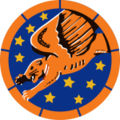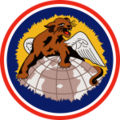Black Face
by Catfish Russ
Major Hubert Merhart von Bernegg walked past furious dust clouds stirred up by ME-109’s on the runway, their engines revving, stacked for another strike into the Balkans. The nights in Bucharest were cold, his rheumatism flared, and he limped to his plane, trying to ignore the dull ache in his hip. The rest of the squadron was waiting for the commander to climb into his plane and lead the flight.
The Allies had convinced the Yugoslavs to revolt. Now the Wehrmacht had to quell this insurgency again, to keep Allied forces off its flanks in the Crimea. Von Bernegg made his peremptory salutes, walked to the lead 109. Two executive officers offered him a hand to climb into the cockpit. They had already started his engines.
The ground crew chief yelled over the din: “...low clouds over the target right now, should be cleared up by the time you get close... also, reports of the 9th Air Force in the air.”
“Ninth Air Force. Sixth Air Force. What does it matter? These kids know nothing.”
“All right, Major, good hunting.” The young flight lieutenant saluted and checked the major’s seat belts. He climbed down the ladder and dragged it off the tarmac.
The canopy down, Von Bernegg donned his helmet and left the goggles on his forehead. He grabbed the stick, pressed the throttle forward and headed down the bumpy runway. Speed built, and 500 meters later his plane was wheels up and climbing.
Von Bernegg brought his plane to 1200 meters and circled while his squadron formed up. Each ME-109 was laden with 120-kilogram bombs. Von Bernegg and his wingman Hans Trubenbach carried none: they would act as fighters and protect the first wave of bombers from the U.S. Army Air Corps now flying over the Balkans from airstrips in occupied Italy.
At 1400 hours the entire twenty-plane strike force was headed westward to hit ammunition caches and oil tanks hidden in the hills of Serbia. For the next hour, it would be a smooth flight: no resistance or Allied Air. Just a chance to think.
He had just heard news that his brother had been captured by Red Army troops counterattacking at Smolensk. He had kept the news from his mother in Stuttgart. Von Bernegg gagged at the thought of being held by Bolsheviks or Slavs of any sort. They weren’t really white people but some sort of racial mix, white Europeans who interbred with Asians trading through the routes of the old Tartars.
Von Bernegg grimaced mentally: the Slavs were a dirty, nasty people, and their backwards, Bolshevik, Jewish sense of government had to be eliminated from the continent. The Führer wanted to make slaves of them all, send them to the Ukraine to work in the fields and not allow them to mix with other peoples, the way Stalin had allowed. Now Stalin was paying the price, himself, for allowing interbreeding, forcibly evicting these mud people from vital strategic territories.
Von Bernegg’s father felt the same way. In fact he remembered his father would not allow his sister to give food to a Roma, a Gypsy begging on a street corner, when they had been on a train ride to Budapest. Ericka had always been a soft person, a weak person who cried when puppies went hungry and turned away when Eisensatzgruppen SS rounded up traitors and Jews and shot them.
Ericka survives because her father is a Nazi Party operative. Otherwise, she would be in a camp somewhere, headed where all the other weaklings in the world are headed. As much as Von Bernegg loved his sister, he could see she had no real future in the Reich.
What surprised Von Bernegg was how hard the resistance was. Of course the Russians were surrendering by the hundreds of thousands. They had no fight in them, or purpose, for that matter. But in France, in Romania, in Hungary, places that were sympathetic to Hitler, the insurgency had caused a lot of damage. The French were sending false artillery strike reports, making German artillery crews miss their targets or even hit their own lines. The Romanians were poisoning Nazi party officials at public restaurants, and somehow, the English seemed to know where all their thrusts were being made all over the map.
Yugoslavia was its own Hell. Slavs lived up in the mountains like American hillbillies, made their own liquor, loaded their own bullets, and picked off German patrols with 19th-century hunting rifles. The hills around Sarajevo and other parts of the Balkans were riddled with caves and impenetrable pines and sheep sorrel and thalia. Entire regiments of insurgents could dance and cook meals all day and all night long in that thicket and no one would ever see or hear them. Every place the Germans had conquered they seemed to have to come back and conquer again.
The invasion in Italy had secured a surrender from the Italian Army even though entire battalions were fighting alongside the Wehrmacht in Russia. The Americans had two or three airstrips and were launching B-25’s and B-17’s out of southern Italy into Germany.
Stuka dive bombers reported robust new American fighters, called Mustangs, over southern Europe. That was a problem. Not that the typical German pilot couldn’t out-fly any American or Brit in the sky, it was just difficult to replace German pilots at the rate necessary to keep an edge in air cover. And the pilots were wearing down, as well. His own unit was averaging three sorties a day per pilot, six days a week, and the calls for continued air strikes and bomber escort were getting louder by the day.
An hour into his flight, the formation reached the first checkpoint, and the last chance to break radio silence from here to the ammunition dumps. Von Bernegg picked up his radio and keyed the mike. “Jagdgeschwäder 52 begin count off... from the rear of the formation.”
A moment later the pilots began counting off, until all the planes were heard from except one. Major Bock’s radio was inoperative, and he rocked his wings back and forth to indicate he could hear the count-off but couldn’t transmit. Not bad. One half-broken radio, 25 planes, 23 laden with enough bombs to light up a town.
“Jagdgeschwäder 52, left turn twenty-six degrees, head two-five-four. When we pass the next range, descend to 1200 meters and begin the drop from the first rail yard to the second rail yard. That is the entire target, let’s take care of it and go home. Maintain radio silence.”
No sooner had he turned off his speaker than a tracer round zipped past his canopy. Von Bernegg looked over his right shoulder and saw ME-109 thirteen was burning and missing part of its rear horizontal stabilizer.
He picked up his radio: “Americans over our shoulders. Break right and left, bear onwards to target. Hans, you and me let’s climb and get over these birds.”
He pulled the stick back and forwarded the throttle. He and his wingman Hans Trubenbach climbed above the formation and watched two more silver P-51’s tear past them down into the formation. Two more 109’s were burning, and one was plummeting to the ground. Radios were cracking with screaming pilots: “....on my tail... taking hits... right above you... break right...”
He climbed to 1800 meters, leveled off, and waited for Trubenbach to follow. Behind and above Trubenbach was another Mustang, shiny silver with a red tail flash. “Hans, behind you... Break, break, break...” Solid shots ripped through Trubenbach’s 109 and it shuddered as the port wing flaps ripped off. A tracer round mashed through the canopy and immediately smoke poured from Trubenbach’s plane. As the canopy frame slid open, the plane burst into flames, turned upside down and plunged into the slope of the mountainside.
Below him, the ambushing Mustangs were wreaking havoc on the bomb-laden 109’s. Many Messerschmitts were jettisoning their bomb loads to make themselves more maneuverable. Von Bernegg lined up behind two P-51’s in a sweeping, descending left turn and looked for a target from about 2100 meters.
He felt the solid thumps of rounds hitting his plane. Over his shoulder, another P-51 was lining up behind him. Von Berneggs’ left rudder pedal did nothing. The right rudder pedal still pulled right, but he was struggling to keep his altitude and broke off the chase. His best bet was to dive low, shake the Mustang, and turn back to base. He hit his right pedal and the 109 made a loping inverted turn downwards. The port wing root started burning. Von Bernegg leveled off and began to slide the canopy back.
It wouldn’t budge.
He pulled again, but a round had jammed the locking toggle shut. He was trapped and his plane was aflame. Von Bernegg struggled to keep his plane level, pulling with all his strength against the stick. He would try a landing, perhaps using treetops to slow his descent.
The P-51 pilot pulled up beside his starboard wingtip. The pilot pulled up his goggles and stared into Von Bernegg’s eyes. Von Bernegg’s plane was vibrating violently and was going down. The Mustang pilot knew it. Rather than finish him off, he pulled up to rejoin the fight.
Von Bernegg’s last thoughts were about the pilot who had bested him, who pulled up beside him, and showed him his black face.
* * *
Later that evening at an airbase in Italy, Flight Lieutenant Meldrick Jefferson Taylor climbed a ladder and painted his first Nazi logo on the side of his Mustang. On his way to dinner, the squadron commander yelled from the ground “Good job, Airman.”
“Thank you sir,” Meldrick answered.
The commander took his dinner in the Officer’s Lounge. Lieutenant Taylor ate his chicken and rice in the Coloreds Only kitchen. He wiped his plate with a piece of cornbread and washed it down with coffee, then returned to the 102nd Bomber Escort Squadron barracks, Tuskegee Airmen, and slept.
Copyright © 2009 by Catfish Russ
Historical note
 99th Fighter Squadron patch |
 100th Fighter Squadron patch |
